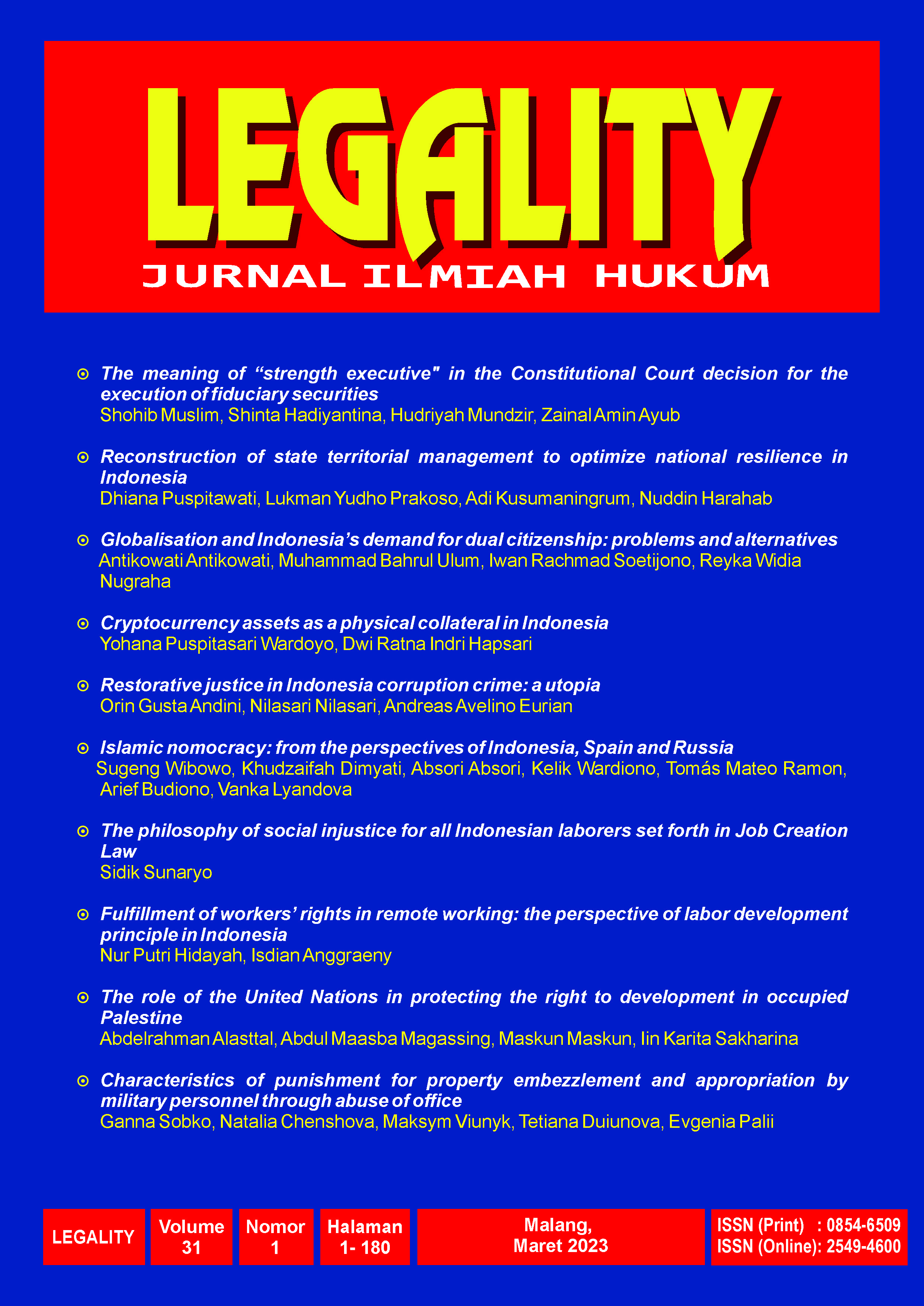Restorative justice in Indonesia corruption crime: a utopia
DOI:
https://doi.org/10.22219/ljih.v31i1.24247Keywords:
Corruption, Criminal Acts, Restorative JusticeAbstract
The discourse about combating corruption through restorative justice has produced positive and negative outcomes. The extraordinary crime of corruption features several distinguishing characteristics distinct from those of general crimes. Even though restorative justice is a method of modernizing the way law enforcement is practiced, the policy that is used to put it into effect needs to be extremely selective and cautious. This study will investigate the applicability of restorative justice to acts of corruption. The research comprises two research questions. 1) How is the concept of Restorative Justice regulated in Indonesia? 2) How is the analysis of Law Number 20 of 2001 concerning Amendments to Law Number 31 of 1999 concerning the Eradication of Corruption Crimes on the resolution of corruption through restorative justice? The research employed a normative method that combined a statutory and conceptual approach to problem formulation, indicating that, first, the restorative justice concept is regulated in Indonesia through technical regulations developed by each law enforcement agency, with limited implementation. Second, restorative justice in the settlement of corruption contravenes Article 4 Law Number 20 of 2001 concerning Amendments to Law Number 31 of 1999 concerning the Eradication of Corruption Crimes and is a step back in efforts to eradicate corruption, as well as inconsistent with the state's obligation to support policies and effective practices in eradicating corruption as regulated by UNCAC.
Downloads
References
Al-Fatih, S. (2018). Darus As An Anti-Corruption Education. Asia Pacific Fraud Journal, 3(1), 118. https://doi.org/10.21532/apfj.001.18.03.01.14
Al-Fatih, S. (2021). The Urgency of Redefinition of Offense Formulation of Corruption in The Law on The Eradication of Corruption. Law Research Review Quarterly, 7(1), 1–18. https://doi.org/10.15294/lrrq.v7i1.43897
Andini, G. O., Marinda, F., & Hamdani, K. (2022). Pertanggungjawaban Tindak Pidana Korupsi yang dilakukan oleh Aparatur Sipil Negara. Jurnal Al-Qadau Peradilan Dan Hukum Keluarga Islam, 9(1), 65. https://doi.org/https://doi.org/10.24252/al-qadau.v9i1.29188
Arrasid, S. E. (2020). Implementasi Surat Edaran Jaksa Agung Nomor: B-113/F/FD.1/05/2010 Dalam Penyelesaian Tindak Pidana Korupsi Dengan Kerugian Negara yang Kecil Oleh Kejaksaan Tinggi Riau. JOM Fakultas Hukum Universitas Riau, VII(2), 15.
Bohmert, M. N., Duwe, G., & Hipple, N. K. (2018). Evaluating Restorative Justice Circles of Support and Accountability: Can Social Support Overcome Structural Barriers? International Journal of Offender Therapy and Comparative Criminology, 62(3), 739–758. https://doi.org/10.1177/0306624X16652627
Braithwaite, J. (1999). Restorative Justice: Assessing Optimistic and Pessimistic Accounts. The University of Chicago Press Journal, 25(1). https://doi.org/https://doi.org/https://doi.org/10.1086/449287
Crown Prosecution Service. (2019). Restorative Justice | The Crown Prosecution Service. The Crown Prosecution Service.
D. Marder, I. (2019). Developing restorative justice in law, policy and practice: Learning from around the world. Penal Reform International.
Davey, L. (2005). The Development of Restorative Justice in The United Kingdom: A Personal Perspective.
Falah Parama, J., & Al-Fatih, S. (2021). Kajian Yuridis Ambivalensi Pergeseran Independensi Komisi Pemberantasan Korupsi (Kpk) Ke Dalam Rumpun Lembaga Eksekutif. Journal Komunitas Yustisia Universitas Pendidikan Ganesha Program Studi Ilmu Hukum, 4(1), 57–65. https://doi.org/https://doi.org/10.23887/jatayu.v4i1.33024
Fariduddin, A. M., Yudistira, N., & Tetono, D. (2022). Imposition of The Death Penalty for Corruptors in Indonesia from A Utilitarian Perspective. Integritas : Jurnal Antikorupsi, 8(1), 1–12. https://doi.org/https://doi.org/10.32697/integritas.v8i1.903
Fatah, A., & Jaya, Nyoman Serikat Putra Juliani, H. (2017). Kajian Yuridis Penerapan Unsur Merugikan Keuangan Negara dalam Penegakan Hukum Tindak Pidana Korupsi. Diponegoro Law Journal, 6(31), 1–15.
Fatahillah Akbar, M. (2021). Keadilan Restoratif dalam Sistem Peradilan Pidana Sebagai Perwujudan Nilai-Nilai Pancasila. Justicia Et Pax, 37(1). https://doi.org/https://doi.org/10.24002/jep.v37i1.3821
Fransisco, W. (2022). Implementation of the Principle of Restorative Justice as an Alternative Resolving to Types of Crimes in the Related Criminal System Corruption Crimes in Indonesia. Legal Brief, 11(4), 2722–4643. https://doi.org/10.35335/legal
Gavrielides, T., & Artinopoulou, V. (2013). Restorative Justice and Violence Against Women: Comparing Greece and The United Kingdom. Asian Journal of Criminology, 8(1), 25–40. https://doi.org/10.1007/s11417-011-9123-x
Genger, P. (2018). Combating Corruption with African Restorative Justice Tradition: Suggested Steps for Nigeria. African Journal of Criminology and Justice Studies, 11(1), 20–40. https://d1wqtxts1xzle7.cloudfront.net/76610446/VOL_2011_20GENGER_20FINAL-libre.pdf
Government, U. K. (2021). Restorative Justice Member Guidance. Publishing Service Government UK.
Gray, C., Hellman, J., & Ryterman, R. (2004). Anti Corruption in Transition 2-Corruption in Enterprise-Sate Interaction in Europe and Central Asia. World Bank Group. https://doi.org/10.1596/0-8213-5808-1
Gunawan, I., & Syahrin, A. (2019). Demand against Law and Using Authority in Corruption Criminal Action. Budapest International Research and Critics Institute (BIRCI-Journal) : Humanities and Social Sciences, 2(4), 194–206. https://doi.org/10.33258/birci.v2i4.580
Gusta Andini, O. (2021). Menakar Relevansi Pedoman Pemidanaan Koruptor Terhadap Upaya Pemberantasan Korupsi. Tanjungpura Law Journal |, 5(2), 133–148. https://doi.org/http://dx.doi.org/10.26418/tlj.v5i2.46109
Hobson, J., Twyman-Ghoshal, A., Banwell-Moore, R., & Ash, D. P. (2022). Restorative Justice, Youth Violence, and Policing: A Review of the Evidence. Laws, 11(4). https://doi.org/10.3390/laws11040062
Hoyle, C., & Rosenblatt, F. F. (2016). Looking Back to the Future: Threats to the Success of Restorative Justice in the United Kingdom. Victims and Offenders, 11(1), 30–49. https://doi.org/10.1080/15564886.2015.1095830
Hoyle, C., Rosenblatt, F. F., Maglione, G., Akester, K., & April, V. (2021). Restorative Justice, Crime Victims and Penal Welfarism. Mapping and Contextualising Restorative Justice Policy in Scotland. Social and Legal Studies, 30(5), 745–767. https://doi.org/10.1177/0964663920965669
Ibrahim, J. (2005). Teori dan Metode Penelitian Hukum Normatif. Bayu Media.
Indonesia, K. A. R. (2020). Peraturan Kejaksaan Republik Indonesia Nomor 15 Tahun 2020 Penghentian Penuntutan Berdasarkan Keadilan Restoratif. 1–14.
Indonesia, K. R. (2021). Peraturan Kepolisian Republik Indonesia Nomor 8 Tahun 2021 tentang Penanganan Tindak Pidana Berdasarkan Keadilan Restoratif.
Irwansyah. (2020). Penelitian Hukum: Pilihan Metode & Praktik Penulisan Artikel (A. Yunus (ed.)). Mirra Buana Media.
Junius Fernando, Z. (2020). Pentingnya Restorative Justice Dalam Konsep Ius Constituendum. Al Imarah : Jurnal Pemerintahan Dan Politik Islam, 5(2), 253. https://doi.org/10.29300/imr.v5i2.3493
Khan, A., Krishnan, S., & Dhir, A. (2021). Electronic government and corruption: Systematic literature review, framework, and agenda for future research. Technological Forecasting and Social Change, 167. https://doi.org/10.1016/j.techfore.2021.120737
Klitgaard, R. (2015). Addressing corruption together. The Development Assistance Committee: Enabling Effective Development, 101.
Komisi Pemberantasan Korupsi. (2022). Kapita, Selekta dan Beban Biaya, Korupsi. Komisi Pemberantasan Korupsi RI.
Korompot, M. I. S., Al-Fatih, S., & Pradhan, D. (2021). The Principle of Equality Before the Law in Indonesian Corruption Case : Is It Relevant ? Journal of Human Rights, Culture and Legal System, 1(3), 135–146. https://doi.org/10.53955/jhcls.v1i3.13
Kubbe, I., & Engelbert, A. (2018). Corruption and the impact of democracy. In Crime, Law and Social Change (Vol. 70, Issue 2, pp. 175–178). Springer Netherlands. https://doi.org/10.1007/s10611-017-9732-0
Kusumo, D., & Afandi, R. (2020). The Restorative Justice: Ideality, Reality, and Problems in The Indonesia Criminal Justice System. Rechtsidee, 7, 1–15. https://doi.org/https://doi.org/10.21070/jihr.v11i0.775
Langseth, P., Stapenhurst, R., & Pope, J. (1997). The Role of National Integrity System in Fighting Corruption. The Wolrd Bank.
Levrant, Cullen, & W. (2016). Reconsidering Restorative Justice: The Corruption of Benevolence Revisited? Sage Journals, 45(1), 22. https://doi.org/doi/10.1177/0011128799045001001
Liputan6.com. (2022, November). KPK Kaji Penerapan Restorative Justice pada Tindak Pidana Korupsi. Liputan6.Com.
MacUlan, E., & Gil Gil, A. (2020). The Rationale and Purposes of Criminal Law and Punishment in Transitional Contexts. Oxford Journal of Legal Studies, 40(1), 132–157. https://doi.org/10.1093/ojls/gqz033
Manan, A. (2020). Ancaman Pidana Mati Terhadap Pemberantasan Tindak Pidana Korupsi. Jurnal Hukum, 36(1), 12. https://doi.org/10.26532/jh.v36i1.11194
Marlina. (2009). Peradilan Pidana Anak di Indonesia, Pengembangan Konsep Diversi dan Restorative Justice. Refika Aditama.
Narindrani, F. (2020). Penyelesaian Korupsi Dengan Menggunakan Restoratif Justice (Corruption Settlement Using Justice Restoratives). Jurnal Penelitian Hukum De Jure, 20(4), 605–617. https://doi.org/http://dx.doi.org/10.30641/dejure.2020.V20.605-617
Nations, U. (2006). Handbook on Restorative Justice Programmes. In Nation,United. United Nation.
Nations, U. (2020). Handbook on Restorative Justice Programmes (Second Edi). United Nations and Thailand Institute of Justice.
Nĕmec, D., Kotlánová, E., Kotlán, I., & Machová, Z. (2021). Corruption, taxation and the impact on the shadow economy. Economies, 9(1). https://doi.org/10.3390/economies9010018
Policing, C. of. (2022). Guidance Restorative Justice Evidence Briefing. College.Police.Uk.
Prosecution Service, T. C. (2022). Legal Guidance Restorative Justice. Government UK.
Purwati, A. (2020). Metode Penelitian Hukum: Teori dan Praktek. Jakad Media Publishing.
Rachel Nanda Catherine. (2022, January). Jaksa Agung Sebut Korupsi di Bawah Rp 50 Juta Tak Perlu Diproses Hukum, Ini Syaratnya. Kompas.Com.
Rahman, K., & Jenkins, M. (2019). Transparency International Overview of Corruption and Anti-Corruption in Bangladesh. In Transparency International.
Safitri, D. (2022). Application of Restorative Justice in the Crime of Theft. NEGREI: Academic Journal of Law and Governance, 2(2), 139. https://doi.org/10.29240/negrei.v2i2.5854
Sharma, A. (2018). New brooms and old: Sweeping up corruption in India, one law at a time. Current Anthropology, 59(S18), S72–S82. https://doi.org/10.1086/696070
Shazeeda, A. (2020). Fighting financial crime: failure is not an option. Journal of Financial Crime. Journal of Financial Crime, 27(1). https://doi.org/https://doi.org/https://doi.org/10.1108/JFC-04-2019-0050
Siburian, R. J., & Wijaya, D. (2022). Korupsi dan Birokrasi: Non-Conviction based Asset Forfeiture sebagai Upaya Penanggulangan Yang Lebih Berdayaguna. Jurnal Penegakan Hukum Dan Keadilan, 3(1), 1–16. https://doi.org/10.18196/jphk.v3i1.12233
Smith, R. (2011). Developing restorative practice: contemporary lessons from an English juvenile diversion project of the 1980s. Contemporary Justice Review, 14(1), 472–478. https://doi.org/Smith, R. (2011). Developing restorative practice: contemporary lessons from an English juvenile diversion project of the 1980s. Contemporaryhttps://doi.org/10.1080/10282580.2011.616372
Snyder, C. (2008). Restorative Justice Across the East and West. In Journal of Comparative Social Work (Vol. 3, Issue 1). https://doi.org/10.31265/jcsw.v3i1.39
Supeno, H. (2020). Krimininalisasi Anak: Tawaran Gagasan Radikal Peradilan Anak Tanpa Pemidanaan. Gramedia.
Suzuki, M., & Jenkins, T. (2022). The role of (self-)forgiveness in restorative justice: Linking restorative justice to desistance. European Journal of Criminology, 19(2), 202–219. https://doi.org/10.1177/1477370819895959
Syaid, A. J. (2022). Implementation of Restorative Justice with Obligation of Reversal Burden of Proof as an Attempt to Restitute State Losses for Justice in the Crime of Money Laundering with Predicate Crime of Corruption. International Journal of Arts and Humanities Studies, 54. https://doi.org/10.32996/bjahs
Tickell, S., & Akester, K. (2004). Restorative Justice: The Way Ahead. Fretwells Ltd.
Tsa Tsia, W. (2022, November). ICW Regarding Restorative Justice Corruption Cases: Perpetrators Are More Profitful, Victims Don’t Get Justice. VOI News.
UNODC. (2019). Concept, Values and Origin of Restorative Justice.
Veresha, R. (2018). Corruption-Related Offences: Articulation Of Perpasive Prevention REVENTION Mechanisms. Journal of Legal, Ethical and Regulatory Issues, 21(4).
Willis, R., & Hoyle, C. (2022). The Good, The Bad, and The Street: Does ‘Street Culture’ Affect Offender Communication and Reception in Restorative Justice? European Journal of Criminology, 19(1), 118–138. https://doi.org/10.1177/1477370819887517
Wolthuis, A. (2022). Restorative Justice: Experience from the Netherlands.
Downloads
Published
How to Cite
Issue
Section
License
Copyright (c) 2023 Orin Gusta Andini, Nilasari Nilasari, Andreas Avelino Eurian

This work is licensed under a Creative Commons Attribution-ShareAlike 4.0 International License.










